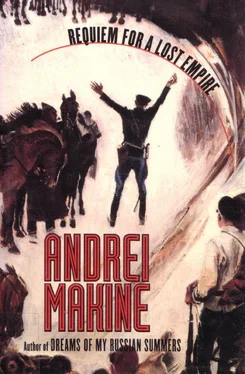My first impression left me perplexed: you resembled the woman who had just been showering praises on the picture. Dark-haired, like her, the same cut to your suit, the same complexion. At once I understood the reason for my mistake. You moved with the same assurance as she, responded to other people's greetings with as much ease, and your perfect mingling with the crowd of guests made you physically similar to the gushy woman. Now that you were coming to meet me I noticed the differences: your hair was darker, your eyes slightly slanting, your brow higher, your mouth… No, you were nothing like her.
As you crossed the room, people stopped you two or three times and I had time to observe you through the looks others gave you, looks of exaggerated lust, appraising your body; possessing you. I pretended to catch sight of you, I began moving toward you, dodging between groups in conversation. It was at the moment when our eyes met that I saw passing across your brow what looked like the shadow swiftly dissimulated, of very great weariness. I was vexed with you for thus, very briefly, puncturing the elation of the first day of my new life. But already you were talking to me like an old acquaintance and letting me kiss you on the cheek. We sauntered about, just like the others. Then, when we saw Shakh in the company of a man with a large, smooth, bald pate, we walked toward the garden bay, so as to be hailed in passing.
An unexpected scene brusquely interrupted this well-regulated playacting. A crowd gathered. A man who could not be seen over the heads of the throng gave a speech like a fairground barker's, in mangled German, reminiscent of that spoken by German soldiers in comic films about the war. We wormed our way into the throng and saw the man displaying a large spinning top to the crowd. His patter was already provoking laughter.
"The Soviets produce these in their arms factories. This means that first of all they can cover up the production of missiles and, secondly, they can give pleasure to children. Even though this machine weighs more than a shell and makes as much noise as a tank. Look!"
The man crouched and pressed down several times on the point of the top to activate the spring concealed inside its nickel-plated body. The toy hurtled into a waltzing rotation, with a tinny clatter, describing wider and wider circles, and forcing the spectators to retreat amid peals of laughter. Some of them, like one guest with patent leather shoes, tried to push the creature away with the tips of their toes. The owner of the top looked triumphant.
"I'm not mistaken, it's him, isn't it?" I asked you, as I moved out of the way of the people beating a retreat.
"Yes. He's aged amazingly, hasn't he?" you said to me, studying the man with the top.
He was a well-known dissident, expelled from Moscow, who lived in Munich. The toy made a last few turns and came to a standstill amid the applause of the guests.
We joined Shakh and the philatelist. This first contact took place as planned, down to the last word. But the vision of the top passed in front of my eyes from time to time.
Going out into the garden, we stopped for a few minutes among the large structures of bronze and concrete for which there had not been enough room inside the gallery. The trees were already turning yellow. "Under autumn leaves," you remarked to me with a smile, "all these masterpieces are much more bearable." And you added, in a voice that seemed to be hesitating over the need for these words, "I'm older than you. My childhood was in the first years after the war. Poverty that made us gnaw stones. I can remember the rare few days when we 'weren't hungry. Real treats. And worst of all, no toys. We didn't know what they were. And then one day someone brought us a box filled with treasures for the New Year: brand new tops that still smelled of paint. Exactly like that one just now. Later on, when they started making dolls and all the rest, we were already too old for toys…"
I was on the brink of telling you that, despite those few years' difference between us, I too had known those great tops and that I loved their smell and even the clatter they made. I said nothing because then I should have had to talk about the child lost in the night in the Caucasus. And yet for the first time in my life that past now seemed to me admissible.
We never know where objects and gestures from the past will one day rise to the surface again, nor how, in the accumulation of years we have lived through. The spinning top in the Berlin art gallery came back to my mind three years later in the middle of that great war-torn African capital. The soldiers who had that day come to search the house where we were living went away carrying our few possessions with them. Two or three garments, a television set, some paper money you had purposely left out on the desk. As they left they were caught in the fire of a heavy machine gun that suddenly raked the fronts of the houses from the end of the street. The group scattered to recover their breath in a narrow alley. Only the last of them was hit as he ran. Caught on his side, he began turning around on the spot, his arms open wide and still laden with confiscated objects. Bullets of this caliber often transform the movements of a person running into a swift waltzing motion, like a top, I thought, and I saw the same memory reflected in your eyes.
During the search they had made me stand facing the wall, like a child being punished. As the mistress of the house you were from time to time asked to open a drawer, offer a glass of water. You performed these tasks without ever interrupting the swishing of an improvised fan: some of the revolutionary leaflets with which the streets were strewn and which had made their way into the houses through broken windows. Between these sheets of paper you had slipped the photos and coded messages that we had neither had time to send to the Center nor to burn. That would have been the one really dangerous discovery. Curiously enough, those leaflets in your hand wove a fragile protective zone around our lives that clearly made the soldiers uneasy. I sensed this tension, I understood it in these young armed men. They were struggling against the temptation to fire a short burst, which would have freed them from our watching eyes and restored the joyful savagery to their looting. But there were these slogans for revolutionary justice, freshly printed on the fan of leaflets. There was also the loudspeaker on a truck that had been showering the streets with appeals for calm and proclaiming the benefits of the new regime ever since the morning. Turning my head slightly, I could see hands stuffing into the bag a transistor, a jacket, and even the lamp clamped to the edge of the table, which you were helping to unfasten, while successfully avoiding giving an indication of the comic side of your involvement. You knew that the slightest change of mood might provoke the pent-up anger and the brief spitting of an automatic rifle. The soldier who removed the lamp also expropriated the banknotes left out on the desk. And, as this action looked more like simple theft than the others that had preceded it, he thought it politic to justify it by talking, in tones both menacing and moralistic, about corruption, imperialism, and the enemies of the revolution. These were the didactic and pompous tones of the loudspeaker. Ceaselessly repeated, such slogans ended up infiltrating even our thoughts and it was in this style that, in spite of myself, I formulated a silent observation, "The money that you have coveted is the end of your revolution. The serpent of cupidity has stolen into your new house."
When they had gone I turned around and saw you sitting there, still mechanically waving your fan of leaflets. The disorder in the room now matched the chaos outside, just as if this had been the purpose of their visit. Through the window we saw them quietly moving up the street, and a second later there came their flight under the crackle of bullets and the waltzing death of the soldier, revolving several times on the spot and scattering the confiscated objects all around him, those familiar fragments of our daily life. He collapsed, I glanced at you, guessing that you had the same memory: "That top…"
Читать дальше










